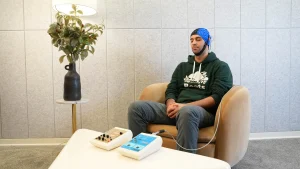Recent research indicates that, on average, 1 in 68 children (specifically, 1 in 42 boys and 1 in 189 girls) have Autism Spectrum Disorder (ASD).
Children with ASD have difficulty functioning in social interactions, in verbal and non-verbal communication, and behavior. They may appear to be insensitive because of their inability to feel empathy or interpret the emotions of others or understand another person’s intentions.
Some of these children may also have an extreme sensitivity to sounds, smells, and tactile sensations. (For example, one little boy couldn’t stand the feeling of socks on his feet.) Children with ASD may also display peculiar behaviors or obsessions.
The success of Neurofeedback with autistic children has been well-researched and documented. It has been shown to improve focus and attention, sleep, social behaviors, and academic functioning; decrease anxiety and impulsivity, and increase appropriate eye contact.
Through a non-invasive, painless technique, neurofeedback creates a “brain map” that identifies where the brain is having trouble processing information. The subsequent treatment sessions, which are created to fit the specific needs of the individual, assist the child in making long-lasting functional changes without any negative side effects

What Symptoms Can Neurofeedback Treat?
A great deal of research has been done on the Neurofeedback treatment of ASD. Results show significant improvements in measures of attention; impulsivity; reading; spelling; arithmetic; and an average 9-point increase in IQ.
Following is a list of 10 symptoms of autism that may be alleviated by Neurofeedback. (Adapted from advancedneurotherapy.com):
- Often a person with autism finds sensory stimuli overwhelming and uncomfortable. To compensate, the person will often repeat physical movements or sounds, sometimes for hours on end. Neurofeedback works to make the brain function more calmly and efficiently, reducing the person’s perception of stimuli as being overwhelming. If the patient feels calmer overall and the stimuli around her does not seem overwhelming, the stimming can be reduced or eliminated.
- Emotional outbursts. Neurofeedback improves emotional control within the brain to help the brain function calmly. Emotional outbursts are often due to feeling overwhelmed, as the brain does not know how to cope with the information being provided to it. When the brain functions more calmly, the person no longer feels compelled to act out emotionally.
- Speech issues. Neurofeedback strengthens brain processing, including the areas in the brain that are responsible for taking in sensory information and building response. Therefore, Neurofeedback sessions can improve a person’s ability to engage in conversation, process what is being said, and then respond appropriately.
- Ritualistic behavior. Ritualistic behavior is often performed to deal with anxiety or overwhelming external stimuli, giving the patient a sense of control. Neurofeedback trains the brain to cope with anxiety and external stimuli with more ease, thereby substantially reducing or eliminating ritualistic behaviors.
- Intolerance to change. Neurofeedback trains the brain to process information calmly and appropriately, so when new information is presented, the person is able to cope with the seemingly sudden change without feeling overwhelmed.
- Hyperactivity. Neurofeedback teaches the brain to function more calmly and deal with anxiety more appropriately, thereby reducing symptoms of hyperactivity.
- Impulsivity. Impulsivity can be significantly reduced or eliminated as the brain learns to cope with anxiety in a healthy, sustainable way through Neurofeedback.
- Inability to follow directions. A person with autism often has difficulty following directions. Neurofeedback sessions enable the brain to function more efficiently and calmly, allowing the patient to improve information processing, which improves the ability to follow directions.
- Anxiety. Many symptoms of ASD are rooted in anxiety. If the brain is flooded with anxiety, processing information can be overwhelming and cause emotional reactions. Once the brain learns to calm itself, anxiety can be reduced or eliminated.
- Issues with social skills. When the brain is working at its best, with far less anxiety and better processing, social interaction becomes easier. Parents of autistic children who have had Neurofeedback treatment have reported a significant improvement in social interaction.
How Many Sessions?
The number of Neurofeedback sessions varies widely and depends on the specific complaints of the individual. Some may show marked improvement after 15 sessions; others may require 40 or more.
Case Studies
The following are real-life stories of two people with autism who underwent neurofeedback therapy (stories courtesy of The Neurodevelopment Center).
Sally
“Sally was smart as a whip. But she struggled to understand the social world and to remain calm and in control of herself. She completely avoided playing with other children her age. She was rigid and bossy. After ten weeks and 20 sessions of neurofeedback training, Sally showed very significant improvements in her social functioning… Sally was able to enjoy herself in play with peers for the first time in her life and was much calmer, more flexible, and happier—in school and at home.”
Sam
“Sam’s Dad came to us looking for a new approach to treatment for autism spectrum disorder. His son Sam was a junior in college. Although Sam had coped reasonably well in high school, he just could not handle the complexities of life in college. He became totally isolated and very depressed. He had to drop out of school. “Sam responded well to Neurofeedback. In ten weeks, after 20 neurofeedback sessions, his social functioning improved dramatically…His Dad joked at the time that he was afraid his son had become a bit of a party animal. For the first time in his life, being social was as much of a priority as grades! Three years later, Sam continues to do very well socially, with several close friends and an active social life.”
Tried and True
Neurofeedback is not a new concept; it was developed over 50 years ago. Decades of research trials have ensued, and the results indicate that neurofeedback is a sustainable treatment with positive, beneficial results for people with autism.
If you want to schedule a Therapeutic Assessment to start the journey, contact us at any time, and we can point you in the right direction.
Elumind Centres for Brain Excellence is an integrated mental health centre offering solutions that can help you with your mental/brain health needs. To start your journey, book your FREE 15-MINUTE PHONE CONSULTATION. We are here for you.








